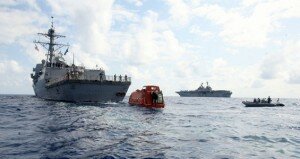
Bartamaha (Nairobi):- More than a year after military counter-piracy patrols were launched in the Indian Ocean, Somali pirates continue to hijack ships and take hostages.
On Tuesday, reports emerged that they had struck again, this time apparently capturing more than 120 Indian sailors working on eight dhows off the coast of Somalia.
Indian authorities are working to verify the reports, but if confirmed, it would be the largest hijacking ever by Somali pirates, and a severe blow to those tasked with stopping their operations.
Naval experts continue to speculate why the pirates, who are often armed with nothing more than AK-47 rifles and light speedboats, are able to beat the world’s advanced navies in a cat-and-mouse game on the high seas.
“The main problem is that for successful counter-piracy you need a common operational procedure,” says Michael Codner, the director of the military science department at the Royal United Services Institute in London.
“The militaries need to integrate all the information they have. That is where the problem lies because a lot of information is classified. You don’t want to give information away that is militarily significant.”
With more than 20 countries currently engaged in counter-piracy patrols in the Indian Ocean, concerns have emerged that a lack of co-ordination is hampering efforts to bring the problem under control.
Balance of power issues
“Most nations who have economies that are dependent on the sea have a common interest in preventing piracy,” Codner says. “However, those particular nations may have problems with other nations who have the same interests.”
Codner explained that balance-of-power issues could arise when EU and Nato fleets operate with the Chinese, the Indians and the US navies.
But top brass in the contributing navies say they do not believe that co-ordination issues are a major problem in dealing with the piracy threat.
“Levels of co-operation have increased,” says Admiral Gary Roughead, the overall Commander of the US Navy, on a visit to Qatar for a naval commanders’ conference.
“The sharing of information has been enhanced and improved over time. We have a very good, co-operative relationship with the Chinese. There has been an exchange of information between the ships that are involved.”
But Roughead admits that there is always room for improvement in the flow of intelligence between the vessels taking part in the counter-piracy initiatives.
Evolving capabilities
Some believe that the pirates’ evolving capabilities present more of a challenge than co-ordination issues within the fleet.
“Every change that is made by the coalition that is working the problem, the pirates change,” Roughead says, adding that ransom money is being used to buy bigger and better equipment for future piracy operations that makes policing the seas more difficult.
“Anytime a ransom is paid, it feeds that criminal business,” he explains. “I’m not advocating the payment of any ransoms because it just feeds the beast.”
As pirates become richer, they are able to buy better equipment, allowing them to increase their operational range and to strike further and further from coast-lines patrolled by international warships.
The further out in the Indian Ocean they operate, the harder the problem becomes to police, and greater the co-ordination needed between naval forces. “As the pirates increase their range, it requires better sharing of information,” Roughead says.
Vulnerabilities
And that is where counter-piracy patrols are at their weakest. With Iran operating unilaterally to escort ships in the region, and an anti-piracy coalition that includes rival nations potentially withholding sensitive information from each other, pirates are able to slip through the gaps in the intelligence picture and continue to strike.
As attacks continue increasingly beyond the policed zones, naval planners are now facing the prospect of patrolling an area of ocean the size of Australia.
Success in tackling the problem will ultimately depend on how well information flows between contributing navies.
———-
Source:- Aljazeera English
By Andrew Wander



